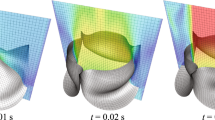Abstract
In this paper, we develop an adaptive finite element method based on reliable and efficient a posteriori error estimates for the H − ψ formulation of eddy current problems with multiply connected conductors. Multiply connected domains are considered by making “cuts”. The competitive performance of the method is demonstrated by an engineering benchmark problem, Team Workshop Problem 7, and a singular problem with analytic solution.
Similar content being viewed by others
References
Ammari H., Buffa A., Nédélec J.C. (2000). A justification of eddy current model for the maxwell equations. SIAM J Appl Math 60:1805–1823
Amrouche C., Bernardi C., Dauge M., Girault V. (1998). Vector potentials in three-dimensional non-smooth domains. Math Methods Appl Sci 21:823–864
Babuška I., Rheinboldt C. (1978). Error estimates for adaptive finite element computations. SIAM J Numer Anal 15:736–754
Beck R., Hiptmar R., Hoppe R.H.W., Wohlmoth B. (2000). Residual based a posteriori error estimations for eddy current computation. 34:159–182
Beck, R., Hiptmar, R., Wohlmoth, B.: Hierarchical error estimator for eddy current computation. In: Neittaanmäki, P., Tiihonen, T. (eds.) ENUMATH 99–Proceedings of the 3rd European Conference on numerical mathematics and advanced applications, Jyväskylä, Finland, July 26-30, 2000, pp. 110–120 World Scientific, Singapore, 2000
Birman M.Sh., Solomyak M.Z. (1987). L 2-Theory of the Maxwell operator in arbitary domains. Usp Mat Nauk 42:61–76 (in Russian); Russ Math Surv 43, 75–96 (1987) (in English)
Bossavit A. (1998). Computational electromagnetism, variational formulations, edge elements, complementarity. Academic, Boston
Bouillault F., Ren Z., Razek A. (1990). Calculation of eddy currents in an asymmetrical conductor with a hole. COMPEL 9(Supple A):227–229
Chen Z., Dai S. (2001). Adaptive Galerkin method with error control for a dynamical Ginzburg-Landau model in superconductivity. SIAM J Numer Anal 38:1961–1985
Chen Z., Dai S. (2002). On the efficiency of adaptive finite element methods for elliptic problems with discontinuous coefficients. SIAM J Sci Comput 24:443–462
Chen Z., Jia F. (2004). An adaptive finite element method with reliable and efficient error control for linear parabolic problems. Math Comput 73:1163–1197
Chen Z., Wu H. (2003). An adaptive finite element method with perfectly matched absorbing layers for the wave scattering by periodic structures. SIAM J Numer Anal 41:799–826
Chen Z., Nochetto R.H., Schmidt A. (2000). An adaptive finite element method with error control for the continuous casting problem. Comput Methods Appl Mech Eng 189:249–276
Chen, Z., Wang, L., Zheng, W.: An adaptive multilevel method for time-harmonic maxwell equations with singularities. Research Report, Institute of Computational Mathematics, Chinese Academy of Sciences (2006)
Ciarlet P.G. (1978). The finite element method for elliptic problems. North-Holland, Amsterdam
Clemens M., Weiland T. (1999). Transient eddy-current calculations with the FI-method. IEEE Trans Magn 35:1163–1166
Costabel M., Dauge M., Nicaise S. (2003). Singularities of eddy current problems. ESAIM: Math Model Numer Anal 37:807–831
Dhia A.B., Hazard C., Lohrengel S. (1999). A singular field method for the solution of Maxwell’s equations in polyhedral domains. SIAM J Appl Math 59:2028–2044
Dular P., Henrotte F., Robert F., Genon A., Legros W. (1997). A generalized source magnetic field calculation method for inductors of any shape. IEEE Trans Magn 33:1398–1401
Fujiwara K., Nakata T. (1990). Results for benchmark problem 7 (a symmetrical conductor with a hole). COMPEL 9:137–154
Girault V., Raviart P.A. (1986). Finite element methods for Naviar–Stokes equations. theory and algorithms. Springer, Berlin Heidelberg New York
Hiptmair R. (2002). Analysis of multilevel methods for eddy current problems. Math Comput 72:1–23
Li K., Ma Y. (1990). Hilbert-space methods for partial differential equations in mathematical physics (I) (in Chinese). Xi’an Jiaotong University press, Xi’an (China)
Monk P. (1998). A posteriori error indicators for Maxwell’s equations. J Comp Appl Math 100:173–190
Morin P., Nochetto R.H., Siebert K.G. (2000). Data oscillations and convergence of adaptive FEM. SIAM J Numer Anal 38:466–488
Nédélec J.C. (1980). Mixed finite elements in \(\mathbb{R}^3\). Numer Math 35:315–341
Pasciak J.E., Zhao J. (2002). Overlapping Schwartz methods in H(curl) on polyhedral domains. East West J Numer Math 10:221–234
Schmidt, A., Siebert, K.G.: ALBERT – An adaptive hierarchical finite element toolbox. the new version ALBERTA is available online from http://www.alberta-fem.de
Scott L.R., Zhang S. (1990). Finite element interpolation of nonsmooth functions satisfying boundary conditions. Math Comput 54:483–493
Stein E.M. (1970). Singular integrals and differetiability properties of functions. Princeton University Press, Princeton
Stephan, E., Maischak, M.: A posteriori error estimate for fem-bem couplings of three-dimensional electromagnetic problems. Report IFAM 72, Institut für Angewandte Mathematik, Universität Hannover, Hannover, Germany 2003
Teltscher M., Stephan E., Maischak M. (2003). A residual error estimator for an electromagnetic fem-bem coupling problem in \(\mathbb{R}^3\). Report IFAM 53, Institut für Angewandte Mathematik, Universität Hannover, Hannover, Germany
Verfürth R. (1996). A review of a posteriori error estimation and adaptive mesh-refinement rechniques. Wiley, Chichester (Stuttgart)
Author information
Authors and Affiliations
Corresponding author
Additional information
W. Zheng was supported in part by China NSF under the grant 10401040.
Z. Chen was supported in part by China NSF under the grant 10025102 and 10428105, and by the National Basic Research Project under the grant 2005CB321701.
Rights and permissions
About this article
Cite this article
Zheng, W., Chen, Z. & Wang, L. An Adaptive Finite Element Method for the H- ψ Formulation of Time-dependent Eddy Current Problems. Numer. Math. 103, 667–689 (2006). https://doi.org/10.1007/s00211-006-0008-3
Received:
Revised:
Published:
Issue Date:
DOI: https://doi.org/10.1007/s00211-006-0008-3




